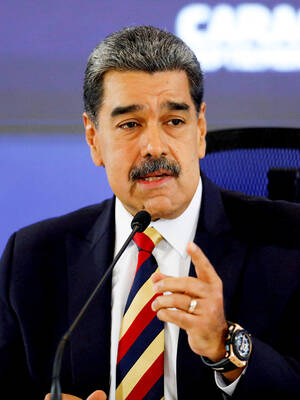After three years of concealing their mouths behind masks, some Japanese are turning to specialist smile tutors to relearn the art of breaking into a beaming grin without looking awkward.
Since lifting the official mask advisory to help prevent the spread of COVID-19, many people have admitted to struggling to adjust to life without face coverings, with some saying they have forgotten how to smile.
“With mask wearing having become the norm, people have had fewer opportunities to smile, and more and more people have developed a complex about it,” Keiko Kawano, a coach at “smile education” company Egaoiku told the Asahi Shimbun.

Photo: AFP
“Moving and relaxing the facial muscles is the key to making a good smile. I want people to spend time consciously smiling for their physical and mental well-being,” Kawano said.
Participants use handheld mirrors to check their progress, with some adjusting their expressions until they are satisfied they have rediscovered their natural grin.
Egaoiku saw the number of applicants rise 4.5 times after media first reported the impending COVID-19 reclassification in February.
A month later, the government said that face coverings should be an individual choice, and downgraded the virus’ severity classification this month.
One of the participants, 79-year-old Akiko Takizawa, said she was excited about going back to her pre-mask life, with a little help from her smile coach.
“I didn’t have opportunities to see people during the coronavirus crisis and didn’t smile in public,” she told the Mainichi Shimbun newspaper. “This has reminded me of how important smiling is.”
The classes, which are particularly popular among women, typically begin with stretches to relieve facial tension before participants raise their handheld mirrors to eye level and flex parts of their face in line with Kawano’s instructions.
“A smile is only a smile if it’s conveyed,” she told her students at a recent session in Yokohama, the Japan Times reported. “Even if you’re thinking about smiling or that you’re happy, if you have no expression, it won’t reach your audience.”
Kawano, a familiar face on TV and social media, has coached more than 4,000 people in the art of smiling over the past six years, the newspaper said, as well as helping hundreds of others become certified “smile specialists.” She now oversees 20 trainers who run classes all over Japan.
Early indications are that their services are likely to be in demand in Japan, where mask-wearing was widespread throughout the COVID-19 pandemic. Just before official advice on mask wearing was eased in mid-March, one in four people said they would continue to cover up in all social settings.
An online survey by Laibo, a research group specializing in careers, found that 27.8 percent of company employees in their 20s to 50s said they would continue to wear masks “unconditionally,” with just more than two-thirds saying they would decide on whether or not to cover up depending on the situation.
Only 5.5 percent said they were happy to go mask-free all the time.

China on Monday announced its first ever sanctions against an individual Japanese lawmaker, targeting China-born Hei Seki for “spreading fallacies” on issues such as Taiwan, Hong Kong and disputed islands, prompting a protest from Tokyo. Beijing has an ongoing spat with Tokyo over islands in the East China Sea claimed by both countries, and considers foreign criticism on sensitive political topics to be acts of interference. Seki, a naturalised Japanese citizen, “spread false information, colluded with Japanese anti-China forces, and wantonly attacked and smeared China”, foreign ministry spokesman Lin Jian told reporters on Monday. “For his own selfish interests, (Seki)

VENEZUELAN ACTION: Marco Rubio said that previous US interdiction efforts have not stemmed the flow of illicit drugs into the US and that ‘blowing them up’ would US President Donald Trump on Wednesday justified a lethal military strike that his administration said was carried out a day earlier against a Venezuelan gang as a necessary effort by the US to send a message to Latin American cartels. Asked why the military did not instead interdict the vessel and capture those on board, Trump said that the operation would cause drug smugglers to think twice about trying to move drugs into the US. “There was massive amounts of drugs coming into our country to kill a lot of people and everybody fully understands that,” Trump said while hosting Polish President

Japan yesterday heralded the coming-of-age of Japanese Prince Hisahito with an elaborate ceremony at the Imperial Palace, where a succession crisis is brewing. The nephew of Japanese Emperor Naruhito, Hisahito received a black silk-and-lacquer crown at the ceremony, which marks the beginning of his royal adult life. “Thank you very much for bestowing the crown today at the coming-of-age ceremony,” Hisahito said. “I will fulfill my duties, being aware of my responsibilities as an adult member of the imperial family.” Although the emperor has a daughter — Princess Aiko — the 23-year-old has been sidelined by the royal family’s male-only

A French couple kept Louise, a playful black panther, in an apartment in northern France, triggering panic when she was spotted roaming nearby rooftops. The pair were were handed suspended jail sentences on Thursday for illegally keeping a wild animal, despite protesting that they saw Louise as their baby. The ruling follows a September 2019 incident when the months-old feline was seen roaming a rooftop in Armentieres after slipping out of the couple’s window. Authorities captured the panther by sedating her with anesthetic darts after she entered a home. No injuries were reported during the animal’s time on the loose. The court in the